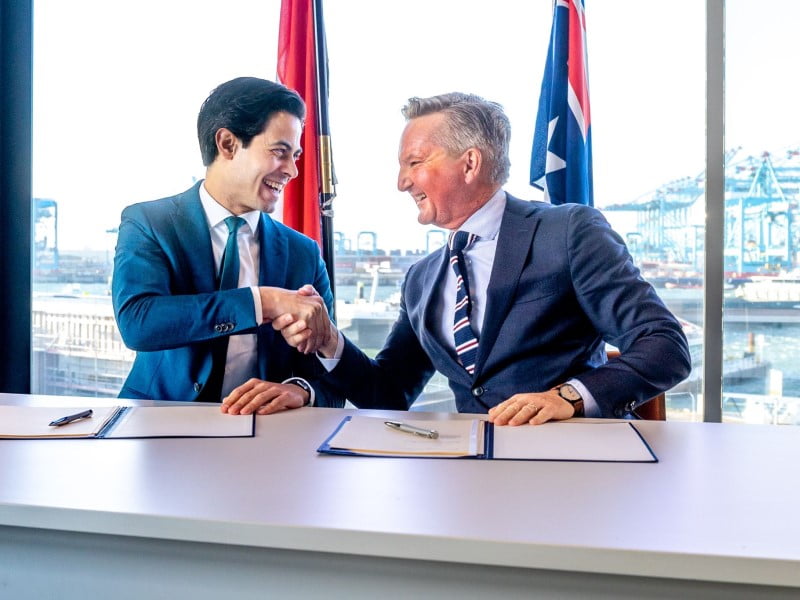The federal government is continuing to back green hydrogen exports, signing a new memorandum of understanding with the Dutch government.
Climate Change and Energy minister Chris Bowen signed a memorandum of understanding with the Netherlands’ Climate and Energy minister Rob Jetten on Monday to promote clean energy supply chains between the two countries.

The broad MoU was signed at the Port of Rotterdam and covers:
- Hydrogen trade policy, standards, and certification schemes
- Port infrastructure and supply chain development
- Innovative hydrogen technologies, including shipping, equipment and services
- Government policies about safety, social licence, and regulations for hydrogen
MoUs have already been signed between the Port of Rotterdam and the state governments of Tasmania, Queensland, Western Australia, and South Australia. These are also aimed at developing a hydrogen export supply chain from Australia to the Netherlands.
A South Australian pre-feasibility study completed at the end of 2021 estimated that the state “could supply up to 10 per cent of Rotterdam’s hydrogen requirements in 2050”, which was estimated to reach 18 million at the time.
The port wants to import 20 million tonnes of hydrogen annually by 2050, and is aiming to begin ammonia imports from 2025.
The Netherlands seaport is also a critical part of Australia’s planned supply of Germany.
A joint Australia-Germany hydrogen supply chain feasibility study HySupply released its final report on Friday, which Mr Bowen said shows green hydrogen exports are “both feasible and desirable”.
The study notes the Port of Rotterdam is “strengthening its position as the largest energy import hub for Germany with exports to Germany to be facilitated through the proposed Delta Corridor”.
The corridor is a hydrogen and carbon dioxide pipeline infrastructure project connecting several industrial hubs between the Netherlands and Germany.
As of November 2021, about 13 per cent of the total energy demand of the European Union first enters the jurisdiction through the Port of Rotterdam.
According to HySupply, the Port of Rotterdam is currently the largest hub for methanol imports and “has announced plans for five ammonia terminals, two liquid organic hydrogen carrier terminals, and one liquid hydrogen terminal”.
Signing the MoU with the Netherlands is a part of Mr Bowen’s 10-day trip across Europe and to the United Arab Emirates. On Tuesday, he will deliver an in-person only address to the Centre for European Policy Studies in Brussels.
On Friday, Mr Bowen was in Germany announcing the successful recipients of the collaborative hydrogen grants program HyGATE and to launch the final HySupply report.
Minister Bowen said the agreement reiterates Australia’s commitment to work with international partners to advancing clean energy interests.
“Hydrogen is a critical technology for the changing global economy and working with countries like the Netherlands will help Australia realise job and investment opportunities of this new industry, and deliver energy security and emissions reductions for trading partners,” Mr Bowen said.
Consultation on the federal government’s Hydrogen Guarantee of Origin scheme, which will certify whether hydrogen has been produced with renewable energy, will close on February 3.
From the private sector, Fortescue Future Industries has signed an MoU with German utility company E.ON to work towards exporting five million tonnes of green hydrogen to Europe by 2030.
Do you know more? Contact James Riley via Email.

